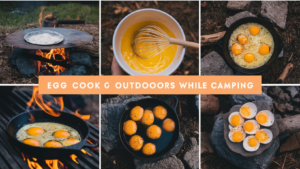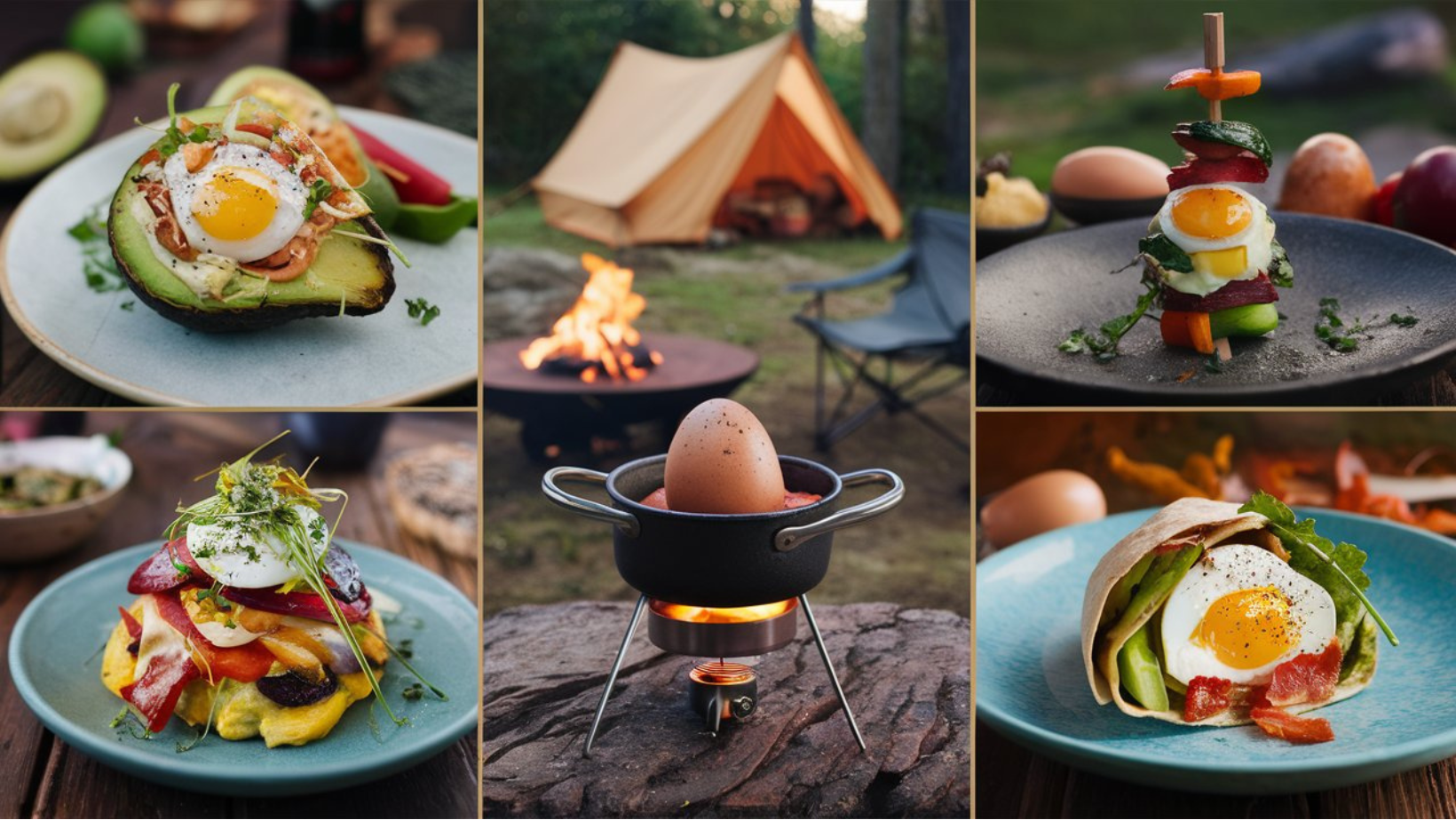Welcome to the ultimate guide on how to make eggs camping. Whether you’re a seasoned camper or new to the great outdoors, mastering the art of cooking eggs can transform your camping meals from mundane to marvelous. In this article, we’ll explore various methods to cook eggs, from boiling to making omelets, all tailored to the camping environment. So, grab your camping gear and get ready to elevate your breakfast game in the wild!
Introduction to Cooking Eggs While Camping
Eggs are a camping favorite—not only are they nutritious and filling, but they’re also versatile and relatively easy to cook outdoors. However, knowing the right techniques can make all the difference between a meal that’s just okay and one that’s truly delightful.
Equipment and Ingredients Needed
Before you head out into the woods, it’s crucial to pack the right tools and ingredients. A portable camp stove or a reliable campfire grate, a non-stick skillet, and of course, fresh eggs, are essential. Don’t forget a sturdy cooler to keep your eggs safe and cool. For the adventurous cooks, bringing along ingredients for toppings like cheese, onions, or even spinach can spice up your dishes.
Packing Tips for Eggs and Ingredients
Transporting eggs without breaking them is easier than you might think. A good tip is to crack the eggs into a plastic bottle or container before leaving home—this not only saves space but also reduces the risk of breakage. For your condiments and additional ingredients, small, resealable bags or containers work wonders in keeping everything organized and fresh.
By starting with the right preparations and packing smart, you’re all set to enjoy delicious egg dishes even while surrounded by nature.
Preparing for Your Camping Trip
Successfully cooking eggs while camping starts long before you fire up your stove. Let’s dive into the crucial steps of preparing and packing, ensuring your camp kitchen is ready for a culinary adventure.
Equipment and Ingredients Needed
To whip up delicious egg dishes in the great outdoors, a few key pieces of equipment are indispensable. First, a portable stove or a campfire-ready grate is essential. You’ll also need a durable frying pan—preferably non-stick—for ease of cooking and cleaning. Remember to bring a pot if you plan to boil eggs, and consider a portable egg holder to avoid any breakfast casualties.
Packing Tips for Eggs and Ingredients
Packing for an egg-centric menu requires careful consideration to avoid spoilage and breakage. Here are some tips:
- Egg Storage: Opt for plastic egg carriers that are designed for camping; they provide protection and are worth the investment.
- Ingredient Organization: Keep it simple with pre-measured spices and toppings in small containers or ziplock bags. This not only saves time but also minimizes waste.
- Cooler Management: Eggs should be kept cool to prevent spoilage. Store them in a hard-sided cooler with ice packs, ideally at the bottom where it’s less likely they’ll get crushed by other items.
Setting up your camp kitchen with the right tools and ingredients organized efficiently means you’ll spend less time preparing and more time enjoying your camping experience.
Egg Cooking Methods
Cooking eggs while camping can be a fun and fulfilling activity, especially when you have the right techniques at your fingertips. Here, we explore various methods to prepare eggs, ensuring that every breakfast is not only easy to make but also delicious and satisfying.

Boiled Eggs
Boiling eggs over a campfire or on a portable stove is straightforward and efficient. You’ll need a pot of water and a heat source. Here’s how to do it:
- Fill a pot with enough water to cover the eggs.
- Once the water reaches a rolling boil, carefully place your eggs in the pot using a spoon or tongs.
- Cook for about 9-12 minutes depending on how firm you like your yolks.
- Remove the eggs and place them in cold water to stop the cooking process and make them easier to peel.
This method is perfect for those who prefer a mess-free, simple way to cook eggs while enjoying the great outdoors.
Scrambled Eggs
Scrambled eggs are a camping favorite due to their simplicity and versatility. To make them over a camp stove:
- Crack the eggs into a bowl and whisk them with a fork, adding a little water or milk for fluffiness.
- Heat a non-stick skillet over your stove and add a small amount of oil or butter.
- Pour in the eggs, stirring continuously with a spatula, until they are soft but fully cooked.
- Add any pre-chopped veggies or cheese you brought for extra flavor.
Fried Eggs
For those who can’t do without their sunny-side up in the morning, frying eggs while camping is equally simple:
- Heat oil or butter in a skillet over medium heat.
- Crack the eggs directly into the skillet. Reduce the heat to low and cook slowly until the whites are completely set and the yolks begin to thicken but are not hard.
Omelettes
Omelettes are great for incorporating various ingredients and making a more substantial meal:
- Beat the eggs in a bowl and pour them into a heated, lightly oiled skillet.
- As the eggs set at the edges, lift them with a spatula, and let the uncooked eggs flow underneath.
- Sprinkle your choice of cheese, vegetables, and maybe some precooked bacon or ham over half of the omelette.
- Fold it over and cook until the filling is heated through.
Eggs in a Bag
This no-fuss, no-muss cooking method involves:
- Cracking eggs into a large, resealable freezer bag with your favorite ingredients.
- Squeeze out as much air as possible and seal the bag.
- Bring a pot of water to a boil and place the bag in the water.
- Cook for about 13-15 minutes, then remove, open, and serve directly from the bag.
Each of these methods allows for creativity and personalization of your breakfast, making your camping meals something to look forward to. For a more detailed guide on a similar method known as hobo eggs, check out this comprehensive article.
Creative Camping Egg Recipes
Elevate your campsite cuisine with these creative egg recipes that go beyond the basics. Each dish is designed to be both delicious and easy to prepare with minimal tools and ingredients, ensuring you can enjoy gourmet meals even while surrounded by nature.
Recipe 1: Campfire Egg Sandwich
Nothing beats starting a brisk morning with a hearty campfire egg sandwich. Here’s how to make it:
- Begin by toasting two slices of bread over the campfire or on your camp stove.
- Fry an egg in a skillet, seasoning with salt and pepper to taste.
- Assemble the sandwich by placing the fried egg between the toasted bread slices, adding a slice of cheese if desired, and perhaps some pre-cooked bacon for extra flavor.
- Wrap the sandwich in aluminum foil and place it back over the fire for a few minutes to melt the cheese and warm everything through.
This sandwich is not only satisfying but also packs the energy you need for a day full of outdoor activities.
Recipe 2: Mountain Man Breakfast
Feed your adventure with a robust Mountain Man Breakfast, a skillet meal that combines eggs, potatoes, and meat in one dish:
- In a large skillet, cook diced potatoes until they’re golden and crispy.
- Add chopped onions and diced bell peppers, cooking until soft.
- Stir in crumbled sausage or bacon, cooking until browned.
- Crack eggs over the top of the potato and meat mixture, cover the skillet, and let everything cook until the eggs are set to your liking.
- Sprinkle shredded cheese over the top and allow it to melt before serving.
This filling breakfast is perfect for sharing and will keep you fueled for hours.
Recipe 3: Paleo-friendly Egg and Veggie Stir-fry
For those watching their diet even while camping, this Paleo-friendly recipe is rich in nutrients and flavor:
- Heat a skillet and add a dash of olive oil.
- Sauté a mix of diced vegetables like bell peppers, onions, and spinach.
- Once the veggies are soft, add beaten eggs and cook, stirring constantly, until the eggs are fully cooked.
- Season with herbs and spices of your choice for added flavor.
This dish is not only colorful and appetizing but also aligns with dietary needs without compromising taste.
These recipes showcase the versatility of eggs and demonstrate how a few simple ingredients can be transformed into delightful meals. Explore different styles of egg breakfasts, including the delightful method of cooking eggs in bread.
Advanced Egg Cooking Techniques for Camping
For those looking to elevate their campsite culinary skills, exploring advanced egg cooking techniques can add a gourmet touch to your outdoor dining experience. Here are some sophisticated methods and ideas to try on your next camping trip.
Advanced Techniques and Tips
- Dutch Oven Egg Bake: Utilize a Dutch oven for a no-fuss, one-pot meal that can serve many. Layer vegetables, meats, and cheese, then pour beaten eggs over the top and cook covered over coals.
- Smoked Eggs: If you have access to a campfire with a grate, you can smoke eggs for a unique flavor. Pre-cook the eggs slightly, then place them near the edge of the grill to absorb the smoky aroma.
- Solar Oven Eggs: For an eco-friendly cooking method, use a solar oven. This can be particularly fun and effective during camping trips in sunny locales.
Innovative Recipe Ideas
- Egg-Stuffed Peppers: Cut bell peppers in half, remove the seeds, and crack an egg into each half. Season with salt, pepper, and herbs, then wrap in foil and cook over a grill or coals until the eggs are set.
- Campfire Eggs Benedict: Prepare a simple hollandaise sauce on your camp stove, poach eggs in a pot, and serve over toasted English muffins with ham or bacon. This classic dish can be a luxurious treat even while camping.
- Savory Egg and Potato Hash: Cook diced potatoes in a skillet until crispy, then add onions, peppers, and diced meats. Crack eggs directly into the skillet, stirring until everything is well-cooked.
These advanced techniques and recipes not only provide a creative challenge but also enhance your enjoyment of cooking in the great outdoors.
FAQs
Cooking eggs while camping can raise several questions, especially for those new to outdoor cooking. Here, we address some common inquiries and provide tips to ensure your camping meals are both successful and enjoyable.
Commonly Asked Questions About Cooking Eggs While Camping
- How do I prevent eggs from breaking during transport?
- Use specialized plastic egg holders or pad your egg container with soft materials like towels or clothing. Alternatively, pre-crack eggs and store them in a hard-sealed bottle or container.
- Can I eat raw eggs while camping?
- It’s best to avoid consuming raw eggs due to the risk of salmonella, especially when you’re in an environment where proper refrigeration is challenging.
- What is the best way to cook eggs for a large group while camping?
- Scrambled eggs or an egg casserole can be made in large batches on a camp stove or over a fire, making it easier to serve everyone at once.
- How do I make sure my eggs are cooked safely over an open fire?
- Ensure the eggs reach a temperature that cooks them thoroughly; scrambled eggs and omelettes should be cooked until there’s no visible liquid egg remaining. Use a thermometer if necessary to check that they’ve reached 160°F.
- Are there any eco-friendly tips for cooking eggs while camping?
- Minimize waste by packing egg ingredients in reusable containers and avoid using disposable plates or utensils. Also, be sure to clean up all trash and leftovers to keep the campsite pristine.
These FAQs not only help in preparing and enjoying eggs while camping but also ensure you do so in a safe and environmentally friendly manner. With these tips and tricks, you can turn your campsite breakfast into a delightful experience.
Conclusion: Mastering the Art of Cooking Eggs While Camping
Cooking eggs while camping offers a delightful way to start your days in the wilderness. With the methods and tips outlined in this guide—from basic boiling and frying to more advanced techniques like egg-stuffed peppers and Dutch oven bakes—you’re well-equipped to turn simple eggs into extraordinary meals. These cooking strategies not only enhance the camping experience but also provide nourishing and tasty options that cater to any camper’s preference. Learn more How to Pack Eggs for Camping
Remember, the key to successful camp cooking lies in preparation and improvisation. Packing the right tools, keeping ingredients fresh, and embracing the rustic conditions of outdoor cooking will lead to memorable and enjoyable meals. Whether you’re preparing a quick scrambled egg breakfast or an elaborate egg casserole, each meal cooked at your campsite can add to the adventure.

